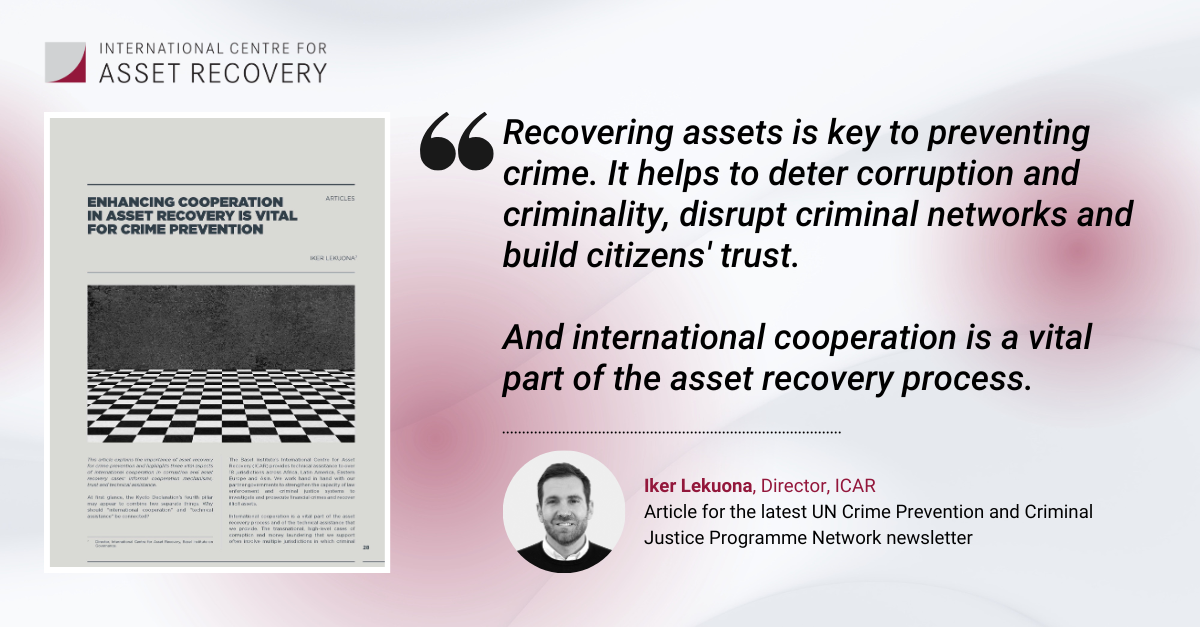Enhancing cooperation in asset recovery is vital for crime prevention

This article by Iker Lekuona explains the importance of asset recovery for crime prevention and highlights three vital aspects of international cooperation in corruption and asset recovery cases: informal cooperation mechanisms, trust and technical assistance.
It is republished with permission from the 6th Newsletter of the United Nations Crime Prevention and Criminal Justice Programme Network of Institutes (PNI). We participate in this network of 18 institutes and entities and strongly support the PNI's mission to "assist the international community in strengthening cooperation in crime prevention and criminal justice on the global, regional and sub-regional levels, within the framework of the United Nations Crime Programme." Find all newsletters and information about the PNI here.
At first glance, the Kyoto Declaration’s fourth pillar may appear to combine two separate things. Why should “international cooperation” and “technical assistance” be connected?
The Basel Institute’s International Centre for Asset Recovery (ICAR) provides technical assistance to over 18 jurisdictions across Africa, Latin America, Eastern Europe and Asia. We work hand in hand with our partner governments to strengthen the capacity of law enforcement and criminal justice systems to investigate and prosecute financial crimes and recover illicit assets.
International cooperation is a vital part of the asset recovery process and of the technical assistance that we provide. The transnational, high-level cases of corruption and money laundering that we support often involve multiple jurisdictions in which criminal proceeds are sourced, transferred, laundered, hidden and spent.
We see constantly that when it comes to asset recovery as a means to prevent and address corruption and other serious transnational crimes, international cooperation and technical assistance go hand in hand.
Asset recovery: key to preventing crime
In the eyes of the public, asset recovery is often seen through the lens of enforcement. It is linked to prosecutions and sanctions and to the desire for justice to be done. But as Article 70 of the Kyoto Declaration emphasises, asset recovery is “an important element of crime prevention… particularly in cases involving corruption”.
At the Basel Institute, we see prevention and enforcement as two sides of the same coin – complementary ways to change behaviours and social norms towards integrity. For asset recovery, three areas stand out.
- Deterrence: Confiscating criminal assets tackles the primary incentive to engage in financial crimes: the money, which is a gateway to power and influence. When public agencies and their foreign counterparts work efficiently to investigate, confiscate and recover illicit assets, this has a strong deterrent effect.
- Disruption: The financial investigations at the heart of the asset recovery process are key to understanding and disrupting organised criminal networks. Techniques such as social network analysis can build on these investigations, mapping the relationships between individuals and entities involved in criminal enterprises, from wildlife trafficking to grand corruption and money laundering schemes.
- Trust: When citizens see that illicit assets are confiscated from corrupt individuals and high-level criminals, this helps to build trust in state institutions and to foster a more stable social environment. This effect is enhanced when recovered assets are reinvested in public goods – for example as Kenya did to pay for hospital equipment during the Covid-19 pandemic or as Zambia has done to fund university education for underprivileged students.
Our technical assistance to partner governments focuses on strengthening every link in the asset recovery process or “chain” – from detection of criminal assets right through to their recovery and return. Sometimes this can go further. In Peru, assets recovered in landmark cases from Switzerland and Luxembourg are being channelled into strengthening the criminal justice system, under an ongoing tripartite agreement that ICAR facilitated.
Through this approach, we see tangible impacts on the strength and functioning of criminal justice systems as a whole in our partner countries. And that can only be positive for crime prevention.
Evolutions in international cooperation for asset recovery
Over the nearly two decades that ICAR has been active as a specialised centre of the Basel Institute on Governance, we have seen promising evolutions in international cooperation in the context of asset recovery:
1. Informal cooperation mechanisms and networks
In line with the Kyoto Declaration’s articles 63 and 64, we have seen a blossoming of positive initiatives to boost informal cooperation between competent authorities on transnational cases of corruption and asset recovery. Such informal cooperation is vital to obtaining intelligence and building connections between counterparts from across borders.
The Global Operational Network of Anti-Corruption Law Enforcement Authorities (GlobE) Network facilitated by UNODC is one such initiative. It eases the exchange of information between frontline anti-corruption law enforcement practitioners across the world. As an observer member, ICAR contributes its experience to the network’s growing efforts to accelerate efforts to identify, trace and confiscate the proceeds of crime.
The International Anti-Corruption Coordination Centre (IACCC) and the Global Forum for Asset Recovery Action Series are two other initiatives that have been game changers in terms of expediting intelligence sharing and cooperation on priority cases. The first is hosted by the UK government, while the second is an initiative of ICAR and the World Bank’s StAR Initiative together with the IACCC. These mechanisms are leading to tangible results in smoothening and complementing formal mutual legal assistance processes.
2. Trust and relationships
The softer aspects of international cooperation shouldn’t be underestimated. We see daily in our work how trust and good relationships between authorities engaged in mutual legal assistance are essential to smoothen the process and lead to a successful result.
This aspect was vital to achieving Colombia’s first-ever international asset return using its non-conviction based forfeiture law in 2024, of nearly half a million dollars in proceeds of drug trafficking from Guernsey. The Colombian authorities recognised ICAR’s “contribution and experience [which] facilitated the rapprochement and communication between the Colombian Attorney General’s Office and His Majesty’s Procureur’s Office in Guernsey.” They noted that “[t]his has been an excellent example of how judicial authorities can work together to ensure the recovery of the proceeds derived from criminal activities.”
Trust, sustained collaboration, communication and positive relationships are also at the heart of successful asset return agreements and frameworks. One example is Jersey’s return of around USD 3.7 million in corruptly obtained funds to Kenya, in a case that had previously been stalled for a decade. Proactive informal cooperation, which ICAR helped to facilitate, was key to building trust between the parties, breaking the deadlock, finding legal solutions to recover the funds and agreeing their safe return for the benefit of Kenyan citizens.
This case was the first asset return under another innovative cooperation agreement based on a sustained relationship of trust: the Framework for the Return of Assets from Corruption and Crime in Kenya (FRACCK). Agreed and signed by the Governments of Kenya, Jersey, Switzerland and the UK, this was praised by UNODC’s Officer-in-Charge of the Corruption and Economic Crime Branch as being an “innovative” and “novel” approach to asset return.
3. Building capacity among international counterparts
Article 66 of the Kyoto Declaration makes it clear why it is not enough just to focus on formal and informal cooperation mechanisms, and why technical assistance is vital to the functioning of the system as a whole. States, it says, should:
“promote, facilitate and support the widest measures of technical assistance, including material support and training, with a view to enabling law enforcement authorities and criminal justice institutions to effectively prevent and combat crimes, taking into account the specific challenges faced by and the particular needs of developing countries.”
International cooperation is a two-way street. Financial centres seeking to detect and confiscate illicit assets will need information and evidence from the countries in which the crimes took place. And a lot of time can be wasted if mutual legal assistance requests are poorly drafted or not in line with the receiving state’s requirements.
Yet many jurisdictions that suffer the worst effects of corruption and crime have low capacity and resources for asset recovery and for international cooperation in general. That is why it is so vital for international donors to support technical assistance programmes aimed at supporting the international cooperation process and building the capacity of counterparts in lower-resource jurisdictions.
This could take the form of financial support, such as the kind provided by ICAR’s core donor group: the governments of Jersey, Liechtenstein, Norway, Switzerland and the UK. This financial support for our hands-on mentoring and training in low-capacity jurisdictions has been vital in enabling us to remain agile and innovative, to pilot new methods before scaling them up, and to provide sustained assistance in partner countries beyond the usual short-term project lifecycle.
To take just one example, our ongoing technical assistance programme in Peru has resulted in the development and implementation of a non-conviction based forfeiture law that has already led to the confiscation of millions in stolen assets domestically and internationally.
Developing asset recovery communities and leaders is another area where states can provide resources and active participation as part of their efforts to promote technical assistance. Practitioner networks are vital for peer learning and to build those trust-based relationships that are so crucial to international cooperation. A standout example is the annual Global Conference on Criminal Finances and Cryptocurrencies, which we organise with Europol and which UNODC hosted this year in Vienna.
Conclusion
Our ICAR teams around the world see at first hand the importance of asset recovery for crime prevention, as the Kyoto Declaration emphasises. Recovering assets helps to deter corruption and criminality, disrupt criminal networks and build citizens' trust.
To boost asset recovery, we need to strengthen every link in the asset recovery process or "chain", from early detection of illicit assets to their eventual recovery and return. And for that, technical assistance is vital.
This article highlights three key areas of technical assistance that align with the Kyoto Declaration's spirit, ICAR's strategic approach and UN-led actions: informal information-sharing mechanisms and networks; efforts to build trust and relationships to smoothen international cooperation; and capacity building between countries.
Learn more
Read Working Paper 51: Good practices in asset recovery legislation in selected OSCE participating States, by Andrew Dornbierer.



